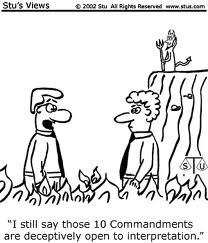-
The P-Factor
Electoral reform is an often-discussed topic. But the issues often concern minor modifications to the status quo. Here I suggest an entirely new approach to electing leaders of a country. It would have numerous benefits over the current system, including: – Better voter turnout – Better representation of the working classes among those who vote
-

There’s nothing that lawyers shouldn’t do
By Charles Foster A patient in his 40s with locked-in syndrome, referred to in court only as ‘Martin’, wants to die. His wife cannot bring herself to help him. He would therefore need help from others. He is concerned that would-be helpers might face prosecution under the assisted suicide legislation. In the latest line of
-
Vegetarians Have Moral Obligation to Eat “Frankenmeat”
The Daily Telegraph reports: Prof Mark Post, of Maastricht University in the Netherlands, yesterday announced the world’s first test tube hamburger would be served up in October. Heston Blumenthal, the experimental chef, will cook the patty grown in a lab from a cow’s stem cells. Each portion will cost £220,000, but Prof Post hopes if
-

Love and other drugs, or why parents should chemically enhance their marriages
By Brian Earp See Brian’s most recent previous post by clicking here. See all of Brian’s previous posts by clicking here. Follow Brian on Twitter by clicking here. Love and other drugs, or why parents should chemically enhance their marriages Valentine’s day has passed, and along with it the usual rush of articles on “the
-
EVENT: Neuroethics Seminar: Two Lectures in Neuroethics
5.30 p.m. – 6.40 p.m. Monday 27 February Seminar Room 1, Oxford Martin School, 34 Broad St (http://www.oxfordmartin.ox.ac.uk/contact/) The session will comprise two brief lectures with q and a: Prof. Neil Levy Resource depletion: the duration of impairment Neil Levy is Deputy Director (Research) of the Oxford Centre for Neuroethics, and Head of Neuroethics at
-
EVENT: Wellcome Lecture in Neuroethics: Neural chemical systems mediate social behaviour in the ‘Tragedy of the Commons’: implications for ethics and the clinic.
Prof. Robert Rogers, Professor of Cognitive Neuroscience, Senior Research Fellow, Jesus College Oxford 29 February, 5.30 p.m. Seminar Room 1, Oxford Martin School, 34 Broad Street (Map: http://www.oxfordmartin.ox.ac.uk/contact/) Recent research has highlighted the role of neurochemical systems, such as serotonin and oxytocin, in the expression of value-laden behaviours involving ‘trust’ or ‘fairness’, in dyadic exchanges
-
Australia’s ‘Gonski Review’ of school funding
Australia’s Federal Labor government can expect a major headache come Monday. Pundits of all stripes are limbering up for the expected fracas that will erupt when the Government releases their long awaited commissioned report on school funding, and their response to it. The report, written by a panel headed by University of NSW Chancellor David
-
Should we Encourage Atheists to get into Foxholes?
‘There are no atheists in foxholes’, as the saying goes. This is of course an exaggeration. There have always been some atheists in foxholes. With millions of military personnel representing this or that country around the world it seems inconceivable that no atheists whatsoever would be occupying foxholes. The Richard Dawkins Foundation appears to like
-
Obligatory Ventilation: why Elective Ventilation should not be elective
On the BBC’s Moral Maze this evening, the question of elective ventilation was discussed at some length. (For those who missed it, the program is still available here). There were several striking features of that discussion, but one argument that stood out was the argument against elective ventilation based on the importance of respecting the
